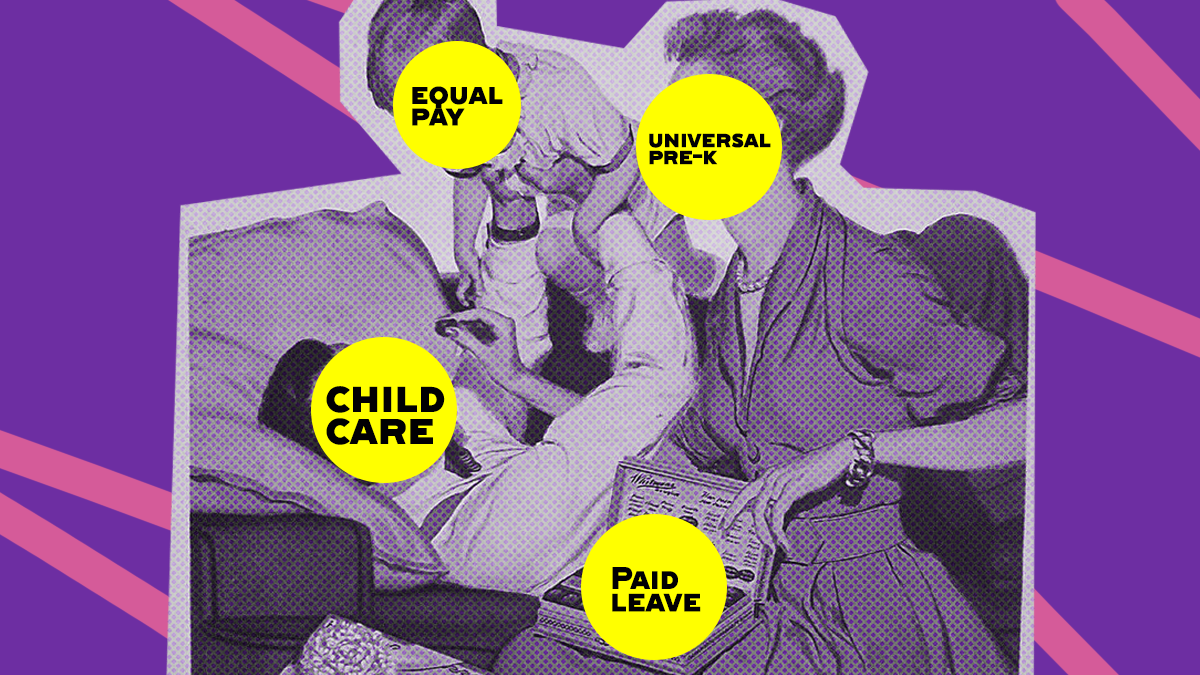All gifts, up to $10,000, TRIPLE-matched until June 30!
America’s Moms Are Still Suffering. We’ve Just Stopped Talking About It.

It’s been a terrible few years. I’m tired, and lonely, and sick of seeking solace in vintage Keeping Up With the Kardashians’ clips on YouTube (update: I’ve found no solace, only Kourtney’s labor-intensive tutorial on how to properly and kardashian-ly eat a Kit Kat).
Many of us (myself included) want things to get back to “normal.” Kit Kats, Kardashians, and otherwise, we’re longing for something that feels familiar, and that is a deeply human emotion.
But we have to remember that our pre-pandemic “normal” wasn’t serving everyone equally. Most especially moms.
September 8 is Moms’ Equal Pay Day, marking how far into the year all employed moms must work to catch up to what all employed dads have already made last year alone.
And let’s just say… today (and every day) things are far from equal.
The wage gap costs moms working full time, year round $17,000 annually, and many moms of color lose even more: Latina moms nearly $38,000, Native American moms nearly $36,000, and Black moms nearly $34,000.
These gaps stem in large part from the fact that moms take on an outsize share of caregiving responsibilities in their families—and for many moms, the pandemic has only increased those demands.
Not to mention, when women become parents, they often suffer a wage penalty at work. And fathers? Well, they’re rewarded with a wage bonus.
All of these widening inequities have taken a massive toll on moms’ finances and mental health, too. We know this because, earlier this year, we surveyed nearly 1,000 moms across the country to find out how they’ve really been faring during the pandemic.
In our findings, we don’t have much to celebrate. But we do have new and enraging statistics that show just how bad things have gotten:
- Only 28% of mothers of children under 5 say they maintain their usual work hours when their children are not at school in person or they do not have child care, compared to 54% of fathers of children under 5
- Among parents who lost or quit a job during the pandemic, only 46% of mothers say they have gotten a new job, compared to 76% of fathers
- Nearly two in five mothers (37%) report their financial situation is worse now than before the pandemic began
- Among employed mothers, more than two in five (43%) report being paid $15 per hour or less
- Nearly three in five mothers (58%) say COVID has had a somewhat or very negative impact on their mental health
These statistics should enrage us and energize us to action.
But instead of helping moms… we settle on calling them “strong.” We laud their impressive, nearly inhuman feats, asking: Seriously, how do they manage it all?
It’s time to stop calling moms strong—and start strengthening their support systems instead.
The Inflation Reduction Act, passed this summer, took some important steps forward for women and families. However, it stopped short of investing in child care and our broader care infrastructure, which would have enabled mothers to participate more equally in our economy.
So, where do we go from here? The first step would be asking moms what they actually want. And then, actually listening to what they have to say.
In our survey, the overwhelming majority of moms (80% or more!) expressed support for the following policies, among others:
- Ensure families can access high-quality, affordable child care, making sure no family pays more than 7% of their income for child care
- Expand access to home- and community-based services for seniors and people with disabilities and improve job quality for home care workers
- Ensure all families can access a more robust child tax credit
- Fund free pre-kindergarten for all children ages 3 and 4
- Provide all workers with paid family and medical leave to take time to care for a child, recover from a serious health condition, or care for a family member with a serious health condition
To put it simply, moms are saying: February 2020 wasn’t working for us. And we can’t afford to get back to “normal.”
Instead, we must invest in these “abnormal” policies that directly help children, families, and caregivers.
Only then can moms come close to achieving the equal pay they so obviously deserve. And maybe next year, we’ll actually have something to celebrate.




